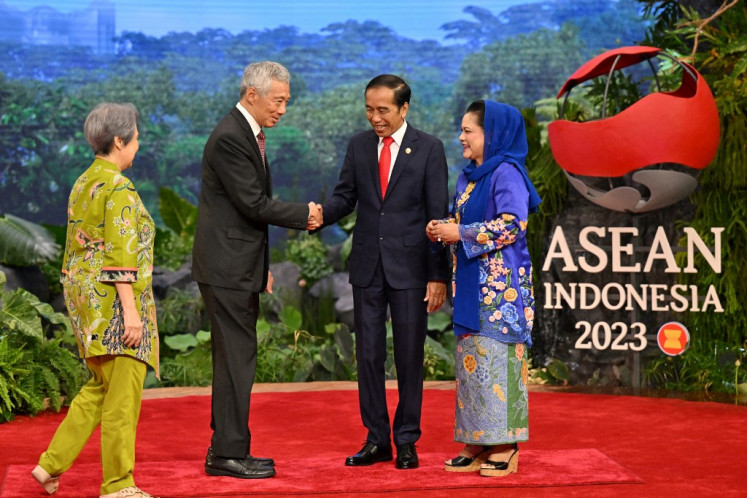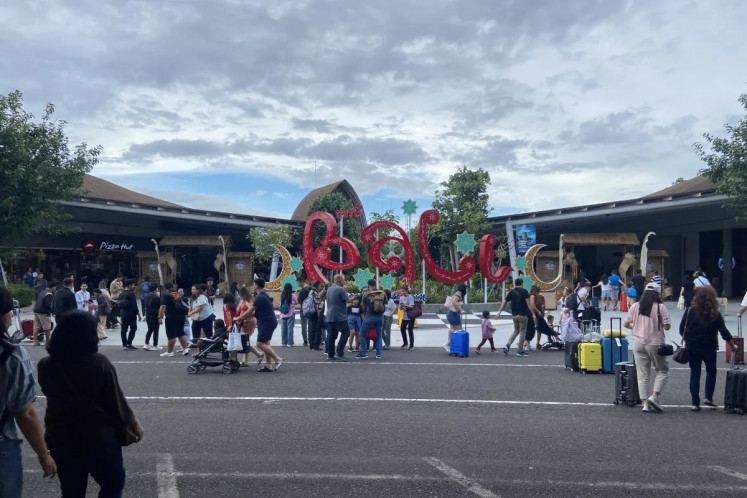Roberto Patino: Democracy movements can be fun
As the leader of a Caracas student movement, Roberto Patino has not only worked on advancing democracy but he has also popularized a youth peaceful movement through a symbol: Hand palms painted white
Change Size

A
s the leader of a Caracas student movement, Roberto Patino has not only worked on advancing democracy but he has also popularized a youth peaceful movement through a symbol: Hand palms painted white.
“Paint the palm of your hands white and raise them up at each protest to show you didn’t bring any weapons or rocks,” said Patino, one of the honorees of John Boyce Hurford tribute, presented by the 6th World Movement for Democracy (WMD), in Jakarta on Wednesday.
“If you want to be a democrat you have to act like one. Do not use violence in your movement otherwise you will be the same as those dictators you fight against,” said Patino in fluent English.
Twenty-one-year old Patino is a final-year engineering student at the Simon Bolivar University and now a leader of the Caracas’s Student Federation at the same university. He was one of the four activists awarded the honor during the WMD event that brought together some 620 activists from 110 countries.
As a leader, Patino has organized student marches against President Hugo Chavez, who has ruled the country for 11 years and is seeking to be in power until at least 2030.
Although Chavez has been recognized by many as an icon of struggle against US hegemony with his nationalist policies, Patino said his president had very little tolerance for his critics inside the country.
“There is no democracy in Venezuela... The government has cracked down on civil groups and its critics. They [authorities] close down TV channels and put people into jail because the latter disagree with his [the President’s] policies,” he said.
Patino added that he had received death threats on several occasions but none would prevent him from pursuing his political objectives once he graduated.
“I have always been interested in politics,” said Patino.
The government’s closing down of Venezuelan Radio Caracas Television in 2006 — because it was perceived as critical of the Chavez administration — stimulated Patino’s interest in student movements.
“The TV shutdown gave birth to a major protest at that time because people were both angry and shocked.
University students came to campus to discuss this issue, and within a short time, a massive protest ensued,” said Patino.
Patino later joined his university’s student movement, which had grown exponentially in size. During this time, his group started using a peaceful approach to protest: they gave flowers to security forces before protests, painted their hands white and erected humorous banners to reduce tension between protesters and law enforcement agencies.
“Humor is important to entice youth into joining the protest,” he said.
“One time, when we took to the streets, we brandished a sign saying: “Sorry, we are working on democracy, on the street, to warn people about the ensuing traffic jam.”
He said the sign had been modeled after construction signs the government used to put up to justify traffic jams.
While many student movements use uprisings to foster a revolution, Patino said his movement wasn’t aimed at toppling the government.
“We want to build a democracy. If we use force to oust the government, that is not a democracy,” he said.
Given Caracas’ notoriety as one of the most dangerous cities in the world — with a high death toll arising from street crimes, Patino said his student movement had to remain unthreatening to avoid triggering chaos on the streets and harsh government resistance.
Patino said the white-painted palms movement had spread to the masses, and managed to draw the attention of youngsters as well as students in the politics of the South American country.
“A student movement should be creative and not only seek to promote a political message. It has to capture the attention of youth by showing that the democracy movement can be fun.”
Patino has popularized the democracy movement, making it accessible and attractive to the masses.
“If a youth movement does not engage technology, it will not attract many to join [its cause],” he said.
JP/WENDRA AJISTYATAMA









